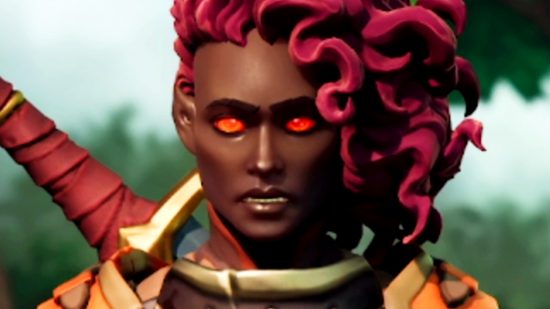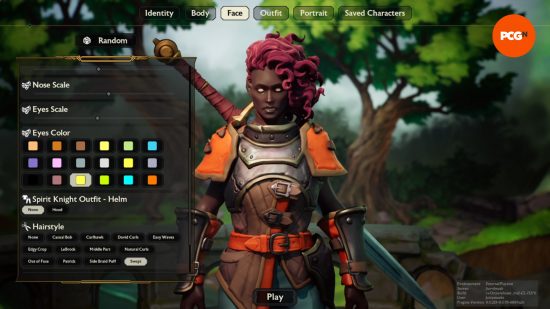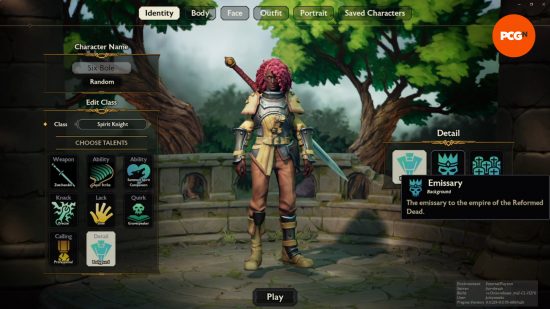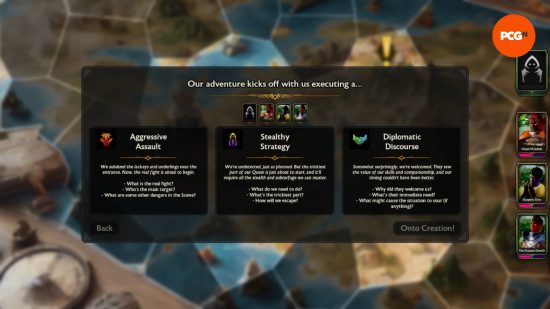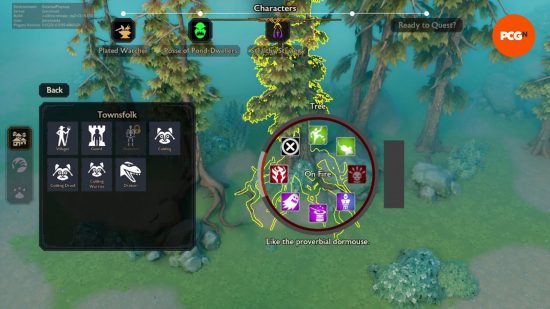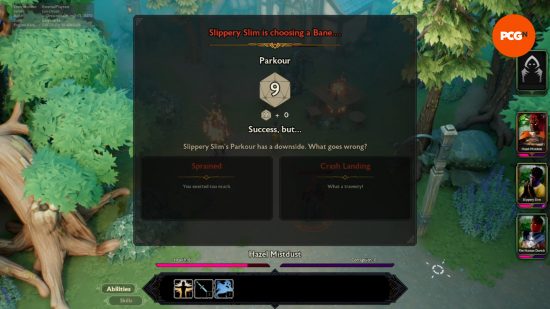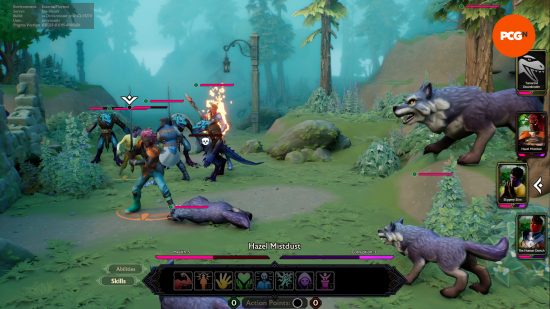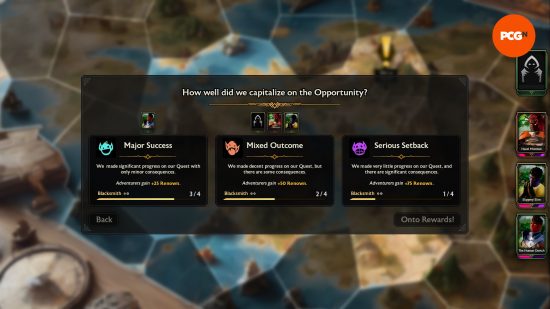If, like me, you loved Baldur’s Gate 3 and it’s got you curious about more player-driven styles of role playing games, a new social RPG from former Blizzard and Epic devs might be the perfect next step. PCGamesN sat down with developer Lightforge Games for a session playing its newly announced Project ORCS, and it’s shaping up to be ideal for anyone who wants to try adventuring with their friends but is overwhelmed by the prospect of picking up a Dungeons and Dragons rule book.
After much teasing, Lightforge Games has finally unveiled Project ORCS (that’s Online Roleplaying with Collaborative Storytelling) to the world – a cooperative ‘social RPG’ that combines the dice-rolling, story-driven adventures of DnD and tabletop-inspired RPG games like Baldur’s Gate 3 with a toolset inspired by the best sandbox games such as Fortnite, Roblox, and Minecraft. I recently had the chance to sit down with the studio’s CEO Matt Schembari, publishing director Nathan Mooney, and PR Aron Garst to play out a session, and was very impressed by what I saw.

From the outset, it’s clear Lightforge has been thinking carefully about a lot of the stumbling blocks that put people off getting into player-driven RPGs, while still offering a system that gives tabletop veterans plenty to work with. That starts at the top, with the dungeon master. Typically, there’s a lot of pressure placed on the person running your adventure to create fun for the players; in Project ORCS, everyone playing contributes to the creative process, making it feel much more like a collaborative effort, and it’s all the more fun for it.
Let’s start, as all great RPGs do, with character creation. The tools at my disposal are pretty robust, giving me plenty of ways to customize my look. For now, Schembari – a former Blizzard lead engineer and Epic Games UI director who helped launch Fortnite Battle Royale – says the team isn’t distinguishing between races, species, or backgrounds, meaning you’re free to come up with the ideal character from your mind without being tied to a specific set of skills or preset story.
You then choose your class – in the build we’re on, I have the choice of a Voidgaze Hunter, a rogue-like expert tracker with occult abilities; an Ember Witch, a keeper of flame who can use fire to harm or heal; and a Spirit Knight, a paladin-style knight that is connected in part to the realm of the dead and can commune with spirits.
You can also swap out your weapon of choice, your abilities, and your character’s background and purpose, along with selecting a ‘Knack and a Lack’ (one strength and one weakness), and a Quirk that determines your class specialization.
Our party is quickly built. I am Hazel Mistdust, a Spirit Knight who’s the best in the business, capable of communing with spirits or summoning them to aid her. I’m also an emissary to the empire of the Reformed Dead – think undead who have made peace and chosen to walk among the living, akin to Elden Ring’s ‘those who live in death.’
I’m joined by Mooney’s light-footed rogue, Slippery Slim, who’s turned his ability to slide through any opening (physical or metaphorical) into a career, and Garst’s ember witch, The Human Dortch. It’s unclear at the outset how much control Dortch has over the flames they wield, but Garst does tell us that he’s been essentially relegated to ‘Suicide Squad status’ after burning down a village he was tasked with saving. It’s perhaps not the company Hazel would have chosen, but she’s a consummate professional.
Your character’s look can be changed on the fly once you’re in-game, so if you don’t like what you see – or the story necessitates a change – you can make it in a snap. That creativity is in fact core to what makes Project ORCS tick. Players can quickly adapt almost anything as they go, making characters bigger or smaller, spawning in new creatures, setting an NPC to be mysteriously dead, or lighting everything you walk past on fire (thanks, the Human Dortch).
Our team now assembled, we kick off our adventure in town. While you can run your whole adventure with just a small party, Schembari says the team envisions large groups collaborating on a central town, and then players grouping up for one-off adventures as and when they’re free, to contribute to the town’s overall progress.
Shembari is our ‘guide,’ meaning he’s in charge of running the adventure – but, as mentioned earlier, Project ORCS is all about collaborative design and storytelling. Key decisions are made by group vote and, while the guide can contribute to this, a majority agreement must be reached between all involved in order for things to progress.
Given a choice between heading to a forest in search of a blacksmith to join the town, or a mausoleum to seek out a sage, we opt for the former. Mooney points out that bringing an uncontrollable firebrand to the woods might be a bad idea, but we’re here to experiment and I’m honestly curious to see how it goes.
Your next step is to decide what that mission looks like. While you can pre-build an adventure or select from some premade options, the real strength of Project ORCS is its ability to allow you to create satisfying quests on the fly, something Schembari calls the “no homework mode.” We vote on a ‘challenge’ – will we run into mysterious cultists, an assembly of the undead, or a posse of pond-dwellers whose home we might be accidentally invading? We also choose if the quest starts with an attack, a stealthy approach, or a negotiation.
Once you arrive at your destination, the creation process begins. Here, everyone has access to a fantastic suite of different assets, allowing you all to craft the scene together. You can place down trees, NPCs, and all manner of other trinkets in what Schembari describes as a “Bob Ross style” of on-the-fly design. The game will auto-generate names for you as you create characters (with some fantastic results), but you can also adjust these if you wish to.
While Schembari is setting up a local family of Drakori – our lizard-like pond-dwellers – I set up a wolf pack, and create a rather sinister side scene where a Cubling warrior called Loquat Rhubarb stands nervously over a dead body (using the game’s ‘twist’ menu that allows you to perform the aforementioned state changes).
Our scene built, we head in, first encountering our suspicious Cubling. Here’s where the actual mechanics of Project ORCS come into play. While most interactions are solved using the roll of everyone’s favorite d20, the system at play here bears closer resemblance to the likes of Dungeon World – rather than a hit or miss, you’ll almost always do the thing you’re trying to, but your roll determines how successfully you pull it off.
Each check is determined by one of the eight core stats. Lighting himself on fire, Garst’s Human Dortch makes a ‘Sway’ check as he calls for Mr Rhubarb to drop his weapon. Schembari gives him a favorable roll, because being shouted down by a blazing, red demon is quite an effective intimidation technique. Dice, when rolled, fall onto the map, bouncing off the environment to determine your success. Here, a high result means we convince the Cubling to stick around and give us some additional help.
I won’t recount the in-depth details of our adventure, but I’ll give you an example of the reverse outcome. Our Cubling friend, incensed by the Dokari’s presence in woods he believes belong rightfully to his people, starts attacking the head of the peaceful family. In an attempt to leap between the pair and make peace, Slim tries some bold parkour.
A less than optimal roll means he burns himself on the table he’s leaping off (I’ll give you three guesses who caught that on fire) and crash-lands in the midst of them. It does put a stop to the fighting long enough to take control of the situation, but it’s a less than optimal outcome that causes some damage. An even worse roll for me as I attempt to catch up to the action causes Hazel to trip and fall, taking damage as she cracks her head against a roadside rock.
In addition to your regular abilities, players can also increase their skill for a check by calling upon raw magic. Doing so increases your character’s ‘corruption’ – we don’t get to see what filling this meter up does today, although Schembari promises that it’ll be “interesting.”
The climax of our adventure, as with most good RPGs, is a fight – here, it transpires that the blacksmith we were seeking has been ripping off the Dokari family, using their mining skills to exploit a rare mineral source for his own gain. He tries to cut us in on the deal, but we’re having none of it, and are pulled into action when he summons that pack of wolves I placed down during the creation period to fight us.
Fortunately, my rolls this time are much more successful, and I strike down the first wolf with such vigor that the others are sent fleeing, which leaves our blacksmith with little option but to put down his sword and come back to town with us. We’ve gained a new town assistant – but he might not be best pleased about it, and Schembari is able to make note of this for any other players in our larger group who might not have been present here.
As we wrap the mission up, we have one final vote – how well did things go? We can pick on a scale between ‘major success’ and ‘serious setback,’ but there’s good reason to not simply go for the best outcome. The better things went, the more town progress we’ll gain, in this case towards setting up a local blacksmith workshop. But the worse things go, the more renown your adventurers will get – there’s no better learning experience than failure, after all.
Project ORCS is really exciting. If you’ve been tempted to try something a little more player-led after the huge success of Baldur’s Gate 3, it’s perfectly set up to put the tools in your hands while also guiding you along the way to ensure you don’t feel overwhelmed. If you’re interested in finding out more, you can wishlist it on Steam now. Project ORCS is set to launch in early access in 2024.
Looking for more of the best games like Baldur’s Gate 3? We’ve got plenty to choose from, along with even more of the best co-op games if you’re after a new adventure alongside your friends.
You can also follow us on Google News for daily PC games news, reviews, and guides, or grab our PCGN deals tracker to net yourself some bargains.
